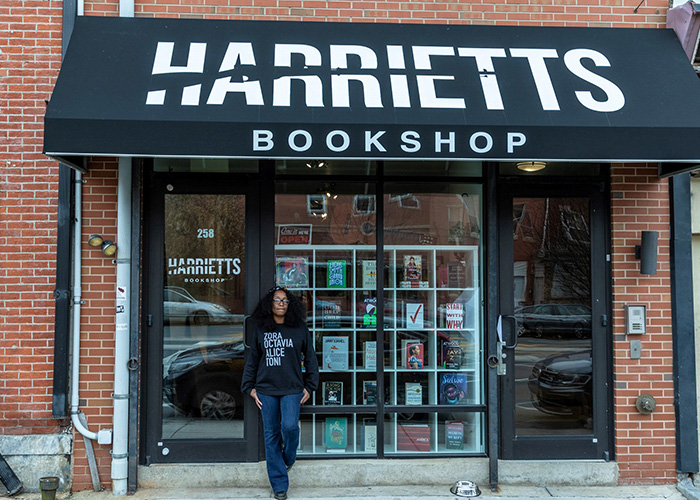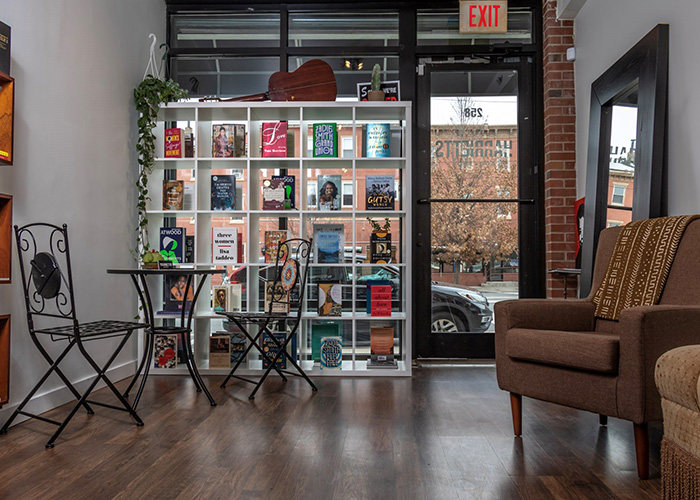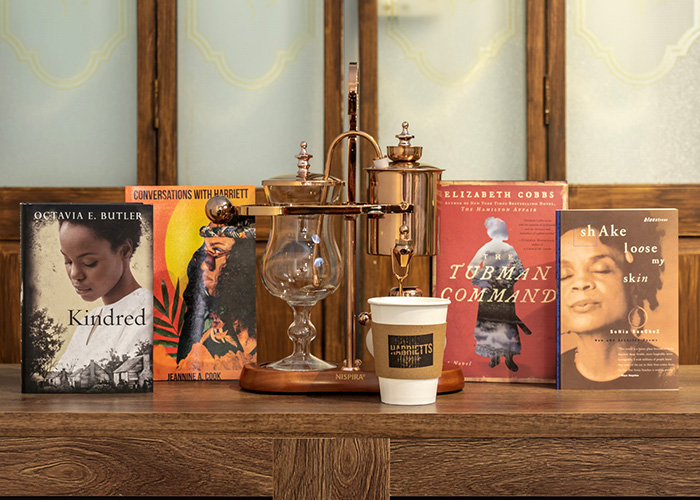Drexel MFA Student Opens Harriett’s Bookshop in Fishtown
BY KYLIE GRAY
February 03, 2020
“You know when something just hits you?”
Sitting in an armchair in her new Fishtown storefront, Jeannine Cook says the idea, which had been percolating for a few years, struck over the holidays: “You need to open a bookstore. And as soon as I decided, it was happening before my eyes.”
Harriett’s Bookshop materialized weeks later in white walls and dark-paneled floors, cubic shelves draped with greenery and books by the likes of Toni Morrison, Zora Neale Hurston and Zinzi Clemmons.
“We’re here to celebrate women authors, and particularly black women writers, in a way that I haven’t been able to find,” says Cook, a community activist and student in Drexel University’s Master of Fine Arts in Creative Writing.
The shop, named in honor of Harriet Tubman, features a monthly literary rotation curated according to a theme — a comingling of new voices and “old voices that are new again,” she says. A second rotating collection is chosen by an artist-in-residence, whose choices are inspired by the artist’s works displayed in the store.
“Jeannine is adding vibrancy and opportunity to the Philadelphia literary landscape through Harriett’s Bookshop,” says Nomi Eve, director of Drexel’s MFA program. “She’s a force to be reckoned with.”
The shop celebrated its official launch on February 1, when it welcomed artists and performers throughout the day to activate the space. But that didn’t stop members of the community from trickling in since early in the new year.
“The support has been amazing — people have gone out of their way to welcome me,” says Cook, a Philly native. “Fishtown really enjoys supporting its local businesses, which is a unique aspect of the area.”

Deep Inspiration
The way the shop seemed to fall into place, piece by piece — the space that happened to be available through a landlord friend, the community’s rush of support even before the store’s official opening — speaks to the sense of purpose which motivated its opening.
“My responsibility to language is bigger than I thought,” Cook says. “I used to teach writing to students who dropped out of high school, and I have seen the power of that — how we can find expression through reading, how characters help us think about the world. I felt compelled to make that accessible to people.”
Cook first experienced a love for reading as a child, instilled in her by her librarian mother. By third grade, she found a hero in abolitionist Harriet Tubman, whom she dressed up as — “wanted to physically embody,” she says — for Black History Month.
Part of what she wants to make accessible to people is the space to dialogue about books and the issues they raise.
“I don’t see how you can be reading and not sharing,” Cook says. “We bookworms look for places to hide, but the bookshop is an open space, where we respect one another and hear each other out.”

In addition to encouraging conversation, the physical openness of the space — a contrast to the crowded rows of shelves found in many bookstores — has allowed it to become a hub for community events and workshops. The bookshop has already hosted a literary-inspired fashion show and a meeting of the Whiskey Writers Club.
Cook sees these face-to-face interactions in contrast to divisive online spaces — a sort of antidote to the climate of polarized politics and social media squabbling.
“We have to evolve past this place of anger. Our city has so much greatness to offer, and it also has one of the highest levels of poverty. It’s going to take courage, knowledge, fearlessness, to move forward,” she says. “In indigenous societies, calling on your ancestors is a way to ask for help and support. I’m calling on Harriet — that fierceness, that fearlessness — for how we can use words to heal our society.”
Cook has already channeled Tubman’s fearlessness in opening the shop, which many cautioned her against over concerns about the market. Going against the grain is something she has long embraced.
“I don’t fit in many boxes. I had a son my sophomore year in college, which took me off the beaten path — and I have continued to create my own path,” she says.
For Cook, that path led her to Drexel’s MFA in Creative Writing, seven years after she first applied to an MFA program. While she has battled with imposter syndrome over her writing, she quickly found a support system in her MFA program, and particularly in program director Nomi Eve.
“Nomi is so nurturing and constantly affirming to the members of the program,” Cook says. “One thing she said that stuck with me: ‘Writers do writerly things.’ It means to keep in a space of writing and reading, to be around and celebrate writers. That wisdom helped me to finish my first book of short stories.”
The book, “Conversations with Harriett,” is currently on the shelf at Harriett’s. For Cook, the idea of legacy building — and having something to leave behind — is an important one.
“I think women, and black women in general, need to do more institution building — from the ground up. How can we do that in a way that challenges systemic issues? A bookshop can be a learning space, a geological space, a creating space,” she says. “Opening the shop makes sense now, and I’m just getting started.”
